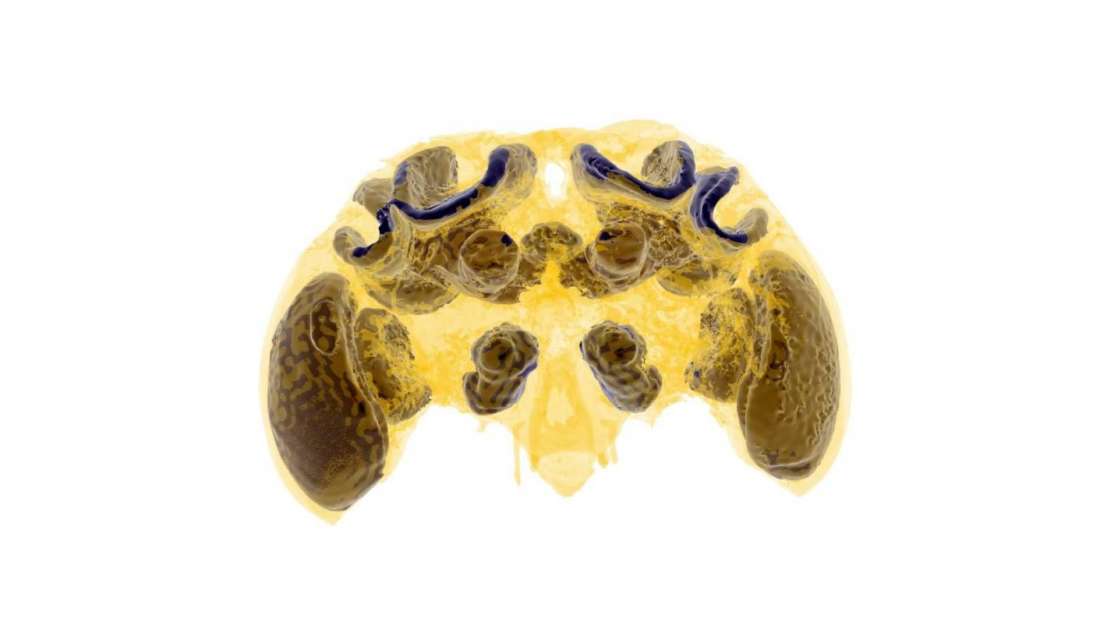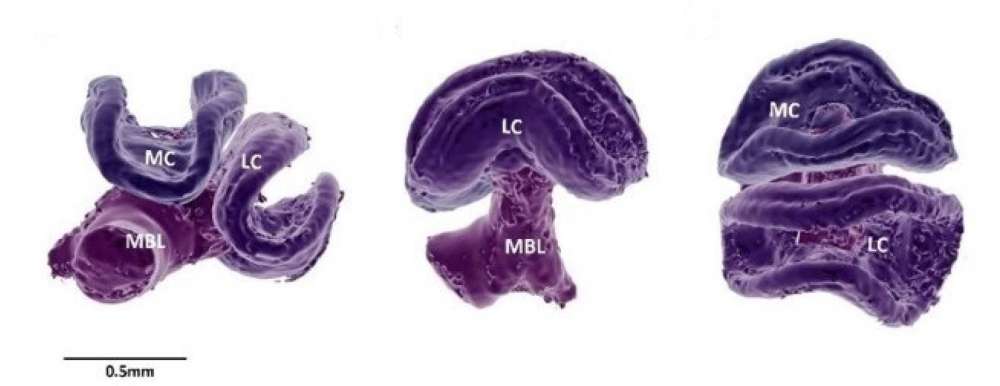这是被杀虫剂喷过的大黄蜂的大脑
这是被杀虫剂喷过的大黄蜂的大脑
Teeny brain scans have shown how pesticides have a damaging effect on the development of baby bumblebee brains.
微小的脑部扫描显示,杀虫剂对大黄蜂宝宝的大脑发育有破坏性的影响。
The research found that exposure to pesticides during the larval stage of bumblebees can mangle their brain development, causing specific parts of the brain to grow less, or abnormally, leaving them with smaller or functionally impaired brains when older. The research also strongly hints that this could help to explain why pesticides have such a dramatic effect on the behavior of bee populations, often impairing foraging bumblebees' ability to navigate and recognize flowers.
研究发现,在大黄蜂幼虫时期接触杀虫剂会阻碍它们的大脑发育,导致大脑特定部分的生长减少或异常,使它们长大后的大脑变得更小或功能受损。这项研究还强烈暗示,这可能有助于解释为什么农药对蜜蜂群体的行为产生如此巨大的影响,往往会削弱大黄蜂觅食和识别花朵的能力。

Tom Hale
Reported in the journal Proceedings of the Royal Society B this week, Imperial College London researchers carried out detailed micro-CT scans on the brains of almost 100 bees – which, for context, are just 0.0002 percent the size of a human brain. Some of the bees were part of a colony that was fed a diet of nectar spiked with neonicotinoids, a controversial pesticide that is banned in parts of Europe but still widely used across the USA.
《英国皇家学会学报B辑》本周报道,伦敦帝国理工学院的研究人员对近100只蜜蜂的大脑进行了详细的微ct扫描,这些蜜蜂的大脑体积仅为人类大脑的0.0002%。一些蜜蜂是一个群体的一部分,它们的食物是添加了新烟碱类杀虫剂的花蜜。新烟碱类杀虫剂是一种有争议的杀虫剂,在欧洲部分地区被禁止使用,但在美国仍被广泛使用。
The team scanned the brains of bees three days and 12 days after emerging from the papal, then compared these results to the young from colonies that were fed no pesticides and others that were fed pesticides only once they had emerged as an adult.
研究小组在蜜蜂从教皇窝里出来3天和12天后分别对它们的大脑进行了扫描,然后将扫描结果与不喂食杀虫剂的幼蜂和成年后才喂食杀虫剂的幼蜂进行了比较。

Views of the mushroom body from a micro-CT scan of a bumblebee brain. Imperial College London
More specifically, the bees that were exposed to pesticides appeared to have a smaller volume of the “mushroom body,” a pair of structures in the brain of insects that play a role in learning and memory (shown above). This makes sense, given the known effect of some pesticides on bees' ability to navigate and forage for food.
更具体地说,接触杀虫剂的蜜蜂的“蘑菇体”体积更小,“蘑菇体”是昆虫大脑中的一对结构,在学习和记忆中起着作用(如上图所示)。考虑到一些农药对蜜蜂导航和觅食能力的影响,这是有道理的。
The research then went a step further and tested the bees’ cognitive abilities by seeing if they associate a smell with a food reward. As anticipated, the pesticide-spiked bees were poorer at performing the task later in life.
研究还进一步测试了蜜蜂的认知能力,看它们是否将气味与食物奖励联系起来。正如预期的那样,使用杀虫剂的蜜蜂在以后的生活中更不善于完成这项任务。
“Bee colonies act as superorganisms, so when any toxins enter the colony, these have the potential to cause problems with the development of the baby bees within it,” lead researcher Dr Richard Gill, from the Department of Life Sciences at Imperial, said in a statement.
帝国理工学院生命科学系的首席研究员理查德·吉尔博士在一份声明中说:“蜂群扮演着超级有机体的角色,所以当任何毒素进入蜂群时,都有可能对里面的小蜜蜂的发育造成问题。”
“Worryingly in this case, when young bees are fed on pesticide-contaminated food, this caused parts of the brain to grow less, leading to older adult bees possessing smaller and functionally impaired brains; an effect that appeared to be permanent and irreversible.”
“令人担忧的是,在这种情况下,当年轻的蜜蜂被喂食农药污染的食物时,这导致大脑的部分生长减少,导致年长的成年蜜蜂拥有更小和功能受损的大脑;这种影响似乎是永久的,不可逆转的。”
The declines of bees and other pollinating insects around the world remains one of the most concerning (and underestimated) challenges of our time. There are many factors behind this, from the destruction of habitat to disease, but the use of pesticides consistently stands out as a major factor. Considering about 35 percent of the world’s food crops depend on animal pollinators to reproduce, that's extremely worrying.
全世界蜜蜂和其他授粉昆虫的减少仍然是我们这个时代最令人担忧(也被低估)的挑战之一。这背后有许多因素,从栖息地的破坏到疾病,但农药的使用始终是一个突出的主要因素。考虑到世界上大约35%的粮食作物依靠动物传粉者来繁殖,这是非常令人担忧的。
- 频道推荐
- |
- 全站推荐
- 推荐下载
- 网站推荐


















